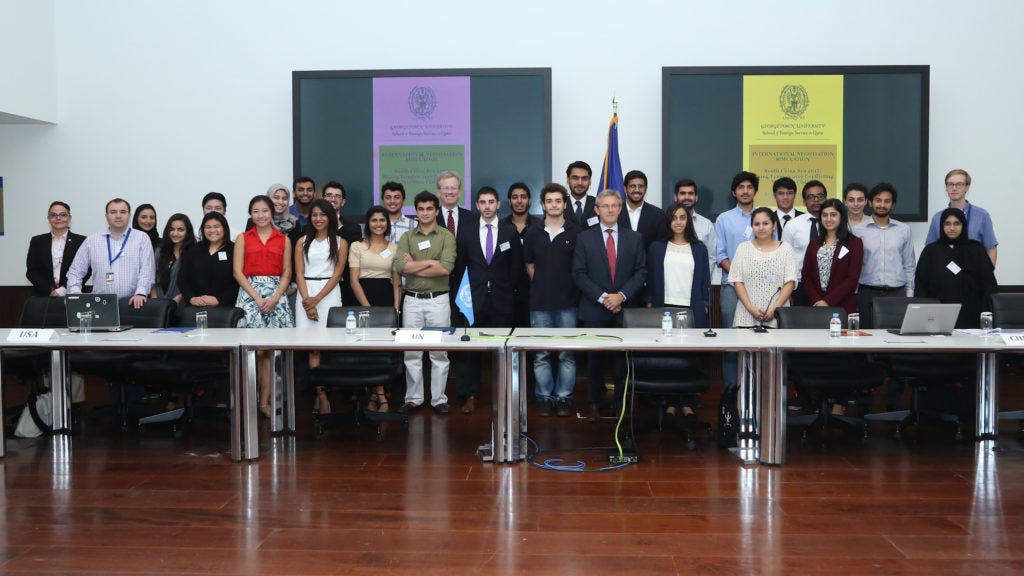Dangerous Tension in the South China Sea at GU-Q’s Student Crisis Simulation Exercise

Georgetown University in Qatar (GU-Q) recently concluded their flagship diplomacy training event, the International Negotiation & Crisis Simulation Exercise, where 30 students developed, practiced, and tested their negotiation and strategic decision-making skills in a simulation exercise about a fictional maritime claim conflict in the South China Sea.
Held in conjunction with Georgetown’s Institute for the Study of Diplomacy (ISD) in Washington D.C., the annual crisis simulation deals with a hypothetical situation that reflects real-world trends or events. During this year’s simulation, groups of 4-5 students were assigned to one of seven diplomatic negotiating teams representing China, Vietnam, the Philippines, Japan, Indonesia, the United States and India, and were tasked with engaging in intensive, bilateral and multilateral negotiations to address the mock situation, in a reconstruction of a real-world diplomatic process.
“The crisis simulation is a tremendous learning opportunity for our students studying international affairs here at Georgetown,” said Dr. Christine Schiwietz, assistant dean for academic affairs at GU-Q and program organizer. “They have to know not only what their own interests are, but also the interests of everyone else involved, and then they have to use critical thinking skills and diplomatic negotiation tactics to try and find a resolution that everyone can agree on. These are vital skills that will empower our students in both a personal and professional capacity whatever career path they choose, not only for those going into Foreign Service.”
For the first time this year, Dr. Schiwietz organized a new negotiation workshop open to all GU-Q students in order to hone their diplomacy skills, where participants were introduced to the fundamental principles of interest-based negotiation found in the famous book, “Getting to Yes: How to Negotiate Agreements Without Giving In”.
The workshop concluded with a special presentation by former U.S. diplomat and Director of Studies at ISD, Dr. Jim Seevers, who discussed basic diplomatic functions such as dialogue, advocacy, and negotiation, and also fielded questions from the students taking part.
In the weeks before the crisis simulation, participants read a background paper and received the mock scenario with a file that describes their assigned country’s position and interests. “Three days prior to the big day, I send everyone ‘extra secret ‘negotiating positions so they know what they have to do to accurately represent their assigned country. This really elevates the stakes and the realism of the scenario, because the pressure to avoid revealing your country’s interests and strategy is already on before we even start the simulation,” said Dr. Schiwietz.
“The crisis stimulation was very engaging and it made us look at how a crisis would be dealt with according to the United Nations standard. It felt very real and made us think deeply about the topic,” said GU-Q student Jyostna Subramaniam, who will graduate in 2017.
“The crisis simulation exercise was a very intense and engaging program that allowed aspiring diplomats to practice diplomacy in a controlled environment .The expert advice and support by former diplomat and Professor Mr. Jim Seevers was very helpful during the tenure. The material provided for the exercise was very engaging and informative. I am looking forward to attending such educative and informative events in the future. “said GU-Q student Sheba George, who will graduate in 2017.
Professor James Seevers and Dr. Schiwietz lead the exercise, with faculty mentors professors Dr. Rory Miller and Dr. Max Oidtmann offering advice and guidance to the separate teams. This year’s special guest player was the dean of GU-Q, Dr. Gerd Nonneman, who assumed the role of the “UN Special Representative” at the end of the exercise, who heard brief presentations from all parties and explored what else could be achieved diplomatically.